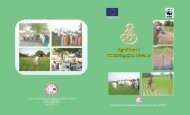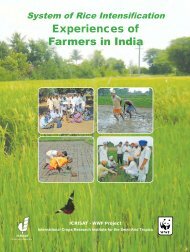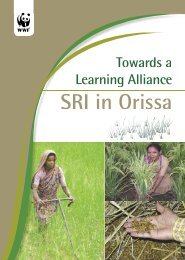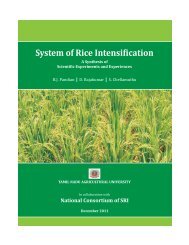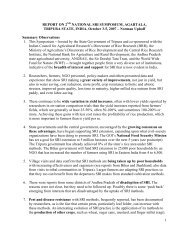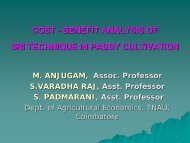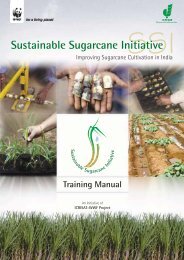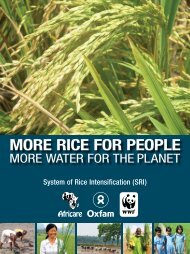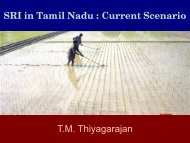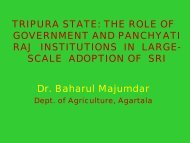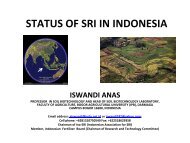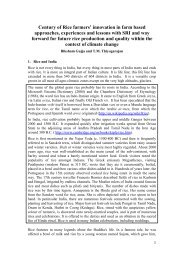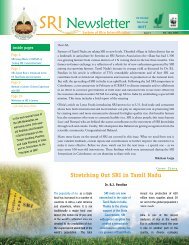SSI Newsletter - SRI - India
SSI Newsletter - SRI - India
SSI Newsletter - SRI - India
Create successful ePaper yourself
Turn your PDF publications into a flip-book with our unique Google optimized e-Paper software.
SugarCane<br />
matters<br />
8<br />
Nov ‘09<br />
maybe we should go to <strong>India</strong> and learn<br />
from the <strong>India</strong>ns. After all, in history,<br />
sugar was first squeezed out of cane<br />
grown in that country (Wikipedia).<br />
Except the latest news is that, in<br />
contrast to the Philippines, last year<br />
<strong>India</strong> had a decline in recovery rate,<br />
which is the amount of sugar you<br />
get out of sugarcane (13 May 2009,<br />
commodityonline.com).<br />
Consider: The above production<br />
figures in reality are estimates, and<br />
yield estimates change during the<br />
year as the weather changes; after<br />
all, in agriculture, harvests are only as<br />
good as the weather allows. So, expect<br />
that for any growing season, any<br />
country’s sugarcane yield estimates<br />
will be revised at least 4 times: early<br />
in the year, before harvest, harvest<br />
time, then afterwards.<br />
In agriculture as in flying, the weather<br />
is a risk. That is to say, your field as<br />
well as your flight is only as good as<br />
your weather. And why is that? As far<br />
as I can tell, the telling effect of the<br />
weather is felt by plants via the water<br />
in the soil. Water is that important.<br />
Mark Twain did say, ‘Everybody talks<br />
about the weather, but nobody does<br />
anything about it.’ In this age of<br />
Climate Change, I say we need to and<br />
indeed we can modify the weather, if<br />
we simply modify the water in the soil:<br />
how much is in it and how much the<br />
plants are taking out and transpiring<br />
from it. We need to practice out-ofthe-box<br />
water management.<br />
I did say we should go to <strong>India</strong> and<br />
learn. You know, we learn from<br />
mistakes, preferably those of others,<br />
preferably big. In this case, <strong>India</strong> is<br />
the biggest sugar producer in the<br />
world (ANN, ethanolindia.net) – and<br />
they must make big mistakes there.<br />
In fact, in 510 BC Emperor Darius of<br />
Persia invaded <strong>India</strong> and found ‘the<br />
reed which gives honey without bees’<br />
(quoted by ANN in sucrose.com). Now<br />
then, the <strong>India</strong>ns have been raising<br />
In fact, in 510 BC<br />
Emperor Darius of Persia<br />
invaded <strong>India</strong> and found<br />
‘the reed which gives<br />
honey without bees’<br />
(quoted by ANN in sucrose.com).<br />
cane for more than 2,500 years; their<br />
huge mistake is that they have been<br />
profligate with their resources when<br />
it comes to the growing of sugarcane:<br />
too much water for the canes in the<br />
field, for one thing.<br />
And that’s one of the modern <strong>India</strong>n<br />
lessons we can learn on campus at<br />
ICRISAT at Patancheru. As far as I<br />
know, they are very serious when<br />
they say, ‘We need to explore every<br />
possible approach to reduce the water<br />
input to all crops, particularly those<br />
which excessively depend on scarce<br />
resources.’ That’s ICRISAT Director<br />
General William Dar speaking. In<br />
other words, he is telling us we have<br />
to save on water, and so do our<br />
crops. I know him personally to be a<br />
non-traditional and out-of-the-box<br />
manager-thinker, looking for, in his<br />
own words, ‘approaches wherein the<br />
resource inputs are low and yields are<br />
high.’ The mantra of the Consultative<br />
Group on International Agricultural<br />
Research, CGIAR, is ‘Doing More with<br />
Less’ – and ICRISAT is part of the<br />
CGIAR. Plow in less, harvest more –<br />
that kind of farming is contrary to<br />
textbook economics, isn’t it? As well<br />
as textbook agriculture.<br />
Going-against-the-grain-of accepted<br />
practices was very much in the minds<br />
of the experts when they worked<br />
out the joint project Sustainable<br />
Sugarcane Initiative, <strong>SSI</strong>. I’m referring<br />
to the World Wide Fund for Nature,<br />
WWF and the International Crops<br />
Research Institute for the Semi-Arid<br />
Tropics, ICRISAT. The Team Leader<br />
for the <strong>SSI</strong> project is Biksham Gujja<br />
of ICRISAT – he has been a Special<br />
Project Scientist for WWF based at the<br />
ICRISAT headquarters in Patancheru,<br />
<strong>India</strong> since 2005.<br />
In this unusual Age of Climate<br />
Change, I do not find it strange that<br />
the panda is talking to the plant.<br />
Based in Switzerland, the current<br />
top panda of WWF is President Chief<br />
Emeka Anyaoku of Nigeria; based in<br />
<strong>India</strong>, the current top crop of ICRISAT<br />
is Director General William Dar of the<br />
Philippines – these tropical minds<br />
were thinking of, if vaguely, if I may<br />
borrow from the science of fisheries,<br />
the concept of optimum sustainable<br />
yield. OSY is where you decrease the<br />
cost in general – in the case of <strong>SSI</strong>,<br />
water, fertilizer and seed in particular<br />
– and yet you do not decrease the<br />
yield – you only maintain it. <strong>SSI</strong> does<br />
OSY one better; it so happens that<br />
in <strong>SSI</strong>, while you decrease the costs,<br />
you increase the yield. Plow in less,<br />
harvest more – <strong>SSI</strong> is sugarcane<br />
agriculture at its best.<br />
The ICRISAT-WWF partnership is a<br />
revelation. The WWF has a mandate<br />
of protecting ecosystems; considering<br />
that, ‘ICRISAT is collaborating with<br />
WWF to understand and integrate the<br />
ecological concerns of agriculture,’<br />
Dar says. ‘This partnership is unique,<br />
and we are looking forward to many<br />
more practical results on the ground.’<br />
Not just theories but practices.<br />
And so, on March 2009, the ICRISAT-<br />
WWF project came up with a training<br />
manual with the long title, Sustainable<br />
Sugarcane Initiative (<strong>SSI</strong>): Improving<br />
Sugarcane Cultivation in <strong>India</strong>. Dated<br />
March 2009 and released May, the<br />
document is in pdf form, 34 pages<br />
with plenty of photographs, freely<br />
downloadable from here: panda.org.<br />
About the training manual, Project<br />
Leader Gujja says that ‘the inspiration<br />
for putting this package together<br />
is from the successful approach of<br />
<strong>SRI</strong>, System of Rice Intensification,’<br />
which has been proven to need less<br />
water and yet to yield more. And do<br />
you know who invented <strong>SRI</strong>? It was<br />
Fr Henri De Laulanie SJ who spent<br />
34 years of his life working with the



